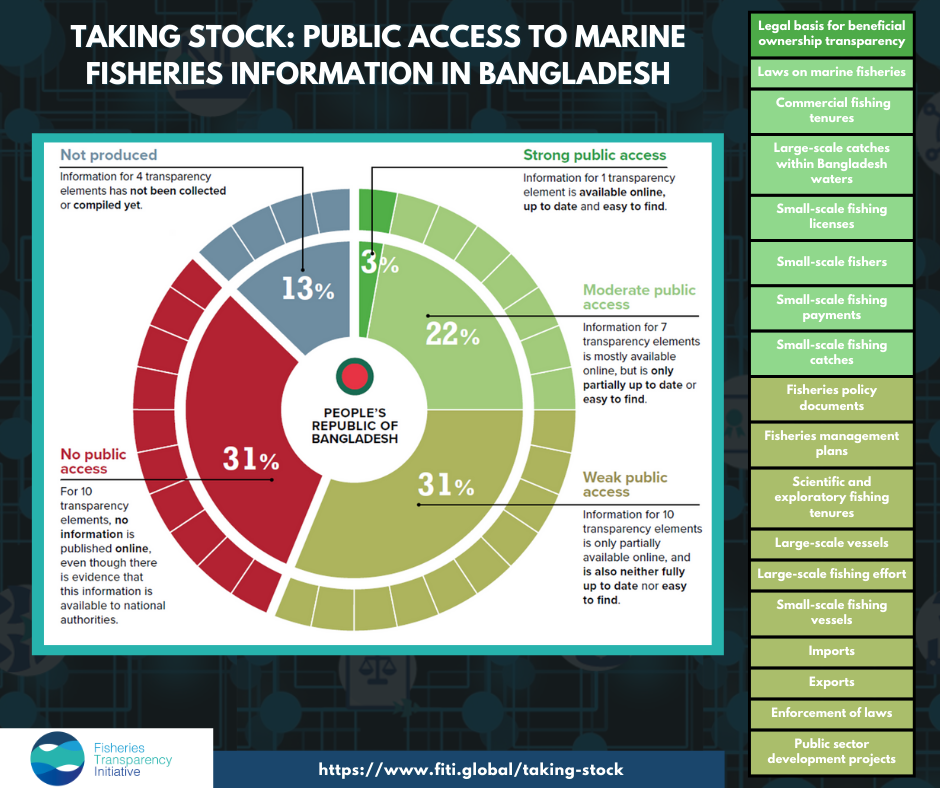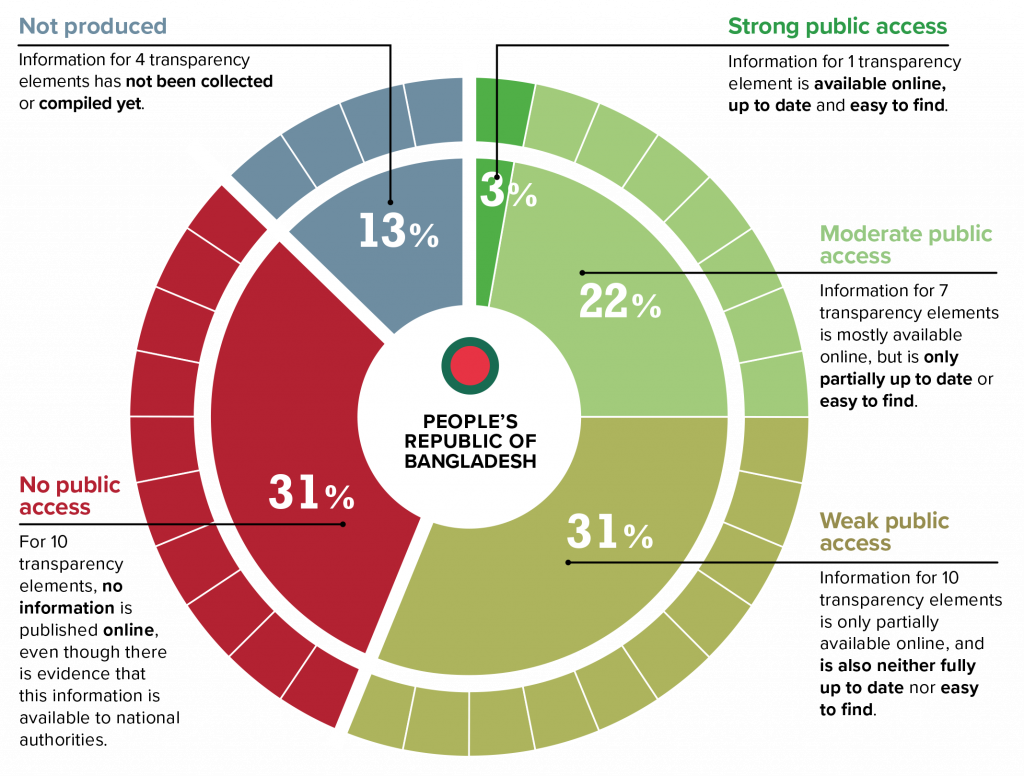Launch of world’s first TAKING STOCK assessment: Government transparency in marine fisheries of Bangladesh

30 March 2022. Today, the Fisheries Transparency Initiative (FiTI) has launched the findings of its inaugural TAKING STOCK assessment, which focuses on Bangladesh and stands as the first in a series of national studies of government transparency in global marine fisheries set to be published over the coming years.
The FiTI’s TAKING STOCK programme is designed to deepen public understanding of how different governments around the world approach transparency in marine fisheries management, providing concrete recommendations where necessary to help strengthen access to information.
TAKING STOCK assessments examine the level of information that national authorities publish on government websites regarding the country’s marine fisheries sector. Beyond simply considering if information is available online, assessments also look at the quality of government information, considering whether it is up to date and easy for people to find. Assessments also document ‘good transparency practices’: instances where governments demonstrate innovative ways of communicating information and stimulating public debates from which other countries can draw inspiration.
Each TAKING STOCK assessment is conducted by a team of researchers, including national experts, who perform desk research of a country’s marine fisheries sector in line with the 12 thematic areas of the FiTI Standard, the only internationally-recognised framework defining what fisheries management information governments should publish online. These thematic areas are broken down into 38 individual transparency elements – ranging from the publication of fisheries laws, policies, management plans and national strategies to respond to illegal fishing, to the latest information on fish catches, employment data, government revenues in the sector, fisheries subsidies and beneficial ownership.
The FiTI International Secretariat does not consolidate the findings of a TAKING STOCK assessment into an overall country score, nor does it plan to compile the results of these assessments into a global fisheries transparency index. There are many reasons why simplified scores or an index of this nature would be problematic. Instead, these assessments seek to provide in-depth analyses of transparency in marine fisheries management and a valuable source of information not only for national authorities, but other stakeholders such as journalists, researchers, parliamentarians, as well as the millions of people engaged in fisheries around the world.
What are the findings for Bangladesh?
Achieving transparency and increasing public access to government information has been a policy promoted by the government of Bangladesh for many years, for example through the enactment of the Right to Information Act in 2009.
Bangladesh’s TAKING STOCK assessment indeed shows that national authorities provide comprehensive information related to certain areas of marine fisheries– a sector that plays a crucial role for the country’s economic and social sustenance. Such information is published on government fisheries websites and also through the Department of Fisheries’ Annual Reports and the Yearbook of Fisheries Statistics of Bangladesh.
However, despite these positive findings, the assessment demonstrates that a significant amount of information remains publicly unavailable and the quality of what is published online is often in need of improvement.

A key finding of this assessment is that Bangladesh’s national authorities collate a wide range of important fisheries information, but often do not publish it online. This lack of online accessibility applies to 31% of the assessed transparency elements and includes, for example, information on fisheries subsidies and information on government revenues from large-scale fishing vessels. National authorities should take proactive steps to share this information with the wider public.
The assessment also shows that the Bangladesh government does not collect or compile any information at all on several important areas of marine fisheries management. This is the case for 13% of the assessed transparency elements, covering, for example, analyses of the health of fish stocks and estimates of the total population of Bangladesh whose income is derived from fisheries, including the number of women working in the sector. These gaps in knowledge may be the result of a lack of technical, financial or human resources. However, not producing such information is likely to undermine efforts to manage fisheries sustainably. This is particularly important in Bangladesh in light of well-established concerns about declining fish populations in the country’s waters, including those upon which the livelihoods of millions of small-scale fishers and fish workers depend.
Additionally, the assessment highlights that information that is published online by the Bangladesh government is often either outdated or difficult to find. This includes information about national policies guiding the fisheries sector, specific fisheries management plans, as well as reports on public sector development projects.
Overall, the assessment notes that presentation and organisation of government information should be further improved in order to better facilitate public understanding of the status of Bangladesh’s marine fisheries – and consequently stimulate national debates around the sector’s management.
Mr Sven Biermann, Executive Director of the FiTI International Secretariat stated that ‘this assessment represents an important milestone for Bangladesh’s marine fisheries sector. But the value of this assessment does not only lie in understanding what information is available online and where gaps exist. Fundamentally, and in very simple terms, public access to fisheries information is important for helping Bangladesh’s national authorities, its citizens and business partners to answer critical questions about the sustainability of the country’s fisheries sector.’
He also noted that ‘our ambition is that this and future TAKING STOCK assessments will contribute to making government transparency the global norm in fisheries management. We are therefore conducting such transparency assessments for several other coastal countries in the upcoming years, including for the United States of America, Peru, Mexico, China, Russia and Indonesia.’
The findings of Bangladesh’s TAKING STOCK assessment are published in a Summary Assessment Report – in English and in Bangla – as well as an in-depth Detailed Assessment Report in English.
The TAKING STOCK assessment for Bangladesh was funded by PROBLUE, an umbrella 2.0 multi-donor trust fund administered by the World Bank.